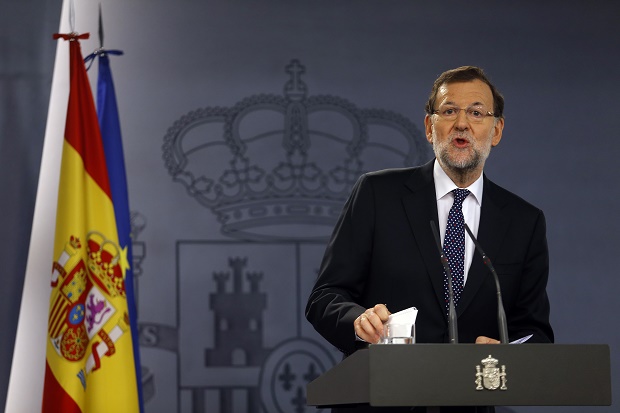Spain PM vows to use ‘all means’ to block Catalan independence bid

Spanish Prime Minister Mariano Rajoy delivers a statement at the Moncloa palace, the premier’s official resident, in Madrid, Tuesday, Oct. 27, 2015. Rajoy promised Tuesday to defend Spain’s unity by all legal means and said a proposal by two secessionist parties to have Catalonia’s regional parliament announce the formal start of independence and the formation of a new republican state of Catalonia will have no effect. AP Photo
MADRID, Spain—Spanish Prime Minister Mariano Rajoy vowed Tuesday to use “all political and legal means” to block a Catalan independence bid after separatist parties presented a bill on secession to the regional Catalan parliament.
READ: Catalan separatists headed for victory — exit poll
In a rare televised address to the nation, two months ahead of a general election, Rajoy slammed the bill as an “act of provocation” which would “have no effect.”
“The state will not hesitate to use all the political and legal means afforded by the law and the constitution to defend Spain’s sovereignty,” he said.
READ: Scotland ‘No’ fails to stop Catalan secession push
Article continues after this advertisementRajoy was speaking just hours after pro-independence parties in the wealthy northeast region of Catalonia announced they would adopt a resolution in early November on moves to create an independent state.
Article continues after this advertisement“The Catalan parliament solemnly declares the start of the process to create an independent Catalan State, in the form of a Republic,” read the text which will be put to a vote in the regional parliament in Barcelona in the coming days.
Pro-independence parties won a majority of 72 seats in the 135-seat Catalan parliament in elections on September 27. The new parliament held its first session on Monday.
During the election campaign the head of the Catalan government, Artur Mas, vowed to set the region on a path toward independence within 18 months if he won the backing of the new parliament.
But while they topped the poll the pro-independence camp failed to win a majority of all votes cast—a fact emphasised by the central government in Madrid, which has fiercely resisted their push for independence.
“As long as I am the head of the government, Spain will remain a nation of free and equal citizens,” said Rajoy, whose conservative Popular Party (PP) faces a tough battle to retain power in a December 20 general election.
He did not specify what means he would use to stop the separatists but last month his government moved to increase the powers of Spain’s Constitutional Court to allow it to sanction public servants and authorities that do not comply with its rulings.
‘Alpha male’
Catalans’ long-standing demands for greater autonomy have intensified in recent years, in tandem with the country’s economic crisis.
The region of 7.5 million people, which has its own widely spoken language, accounts for a fifth of Spain’s economic output.
Rajoy has faced growing pressure within his party to mount a tougher defence of a unified Spanish state.
PP lawmaker Cayetana Alvarez de Toledo quit the party earlier this month, accusing it of not defending Spain against Catalan separatism, echoing criticism from former conservative prime minister Jose Maria Aznar.
The PP has enjoyed an absolute majority in the national parliament since 2011 but polls show it has since lost ground, especially to the new centre-right party Ciudadanos, which has taken a tough line on Catalan separatism.
Ciudadanos leader Albert Rivera called the independence bill a “challenge to democracy” and called on the government to take the matter to the constitutional court.
“Mariano Rajoy would have loved to avoid the topic of Catalonia because he will go down in history as the head of government under whose watch Catalan separatists won an absolute majority in parliament,” said political analyst Josep Ramoneda.
“But he needed to show that he is an alpha male,” Ramoneda added.
Mas meanwhile needed to submit the resolution to secure the support of the leftist Popular Unity Candidacy (CUP), which has ten votes in the Catalan parliament, Ramoneda added.
Mas’ “Together for Yes” coalition, which won 62 seats in the September election, needs the backing of the staunchly nationalist CUP to form a government and press ahead with his secessionist plans.
As the new parliament in Barcelona got down to work, Spanish police raided the homes and offices of the family of Jordi Pujol, a former longtime leader of Catalonia, as part of a probe into alleged tax fraud and money laundering.
Mas was a protege of Pujol, who founded Catalonia’s governing Convergence party and served as the region’s president from 1980 to 2003. His own house was among those searched on Tuesday.
The operations come a week after a series of arrests and raids in Catalonia, carried out as part of a separate probe into Convergence’s finances.
Catalan officials see the investigation as a politically-motivated attempt to avenge the separatists’ campaign.